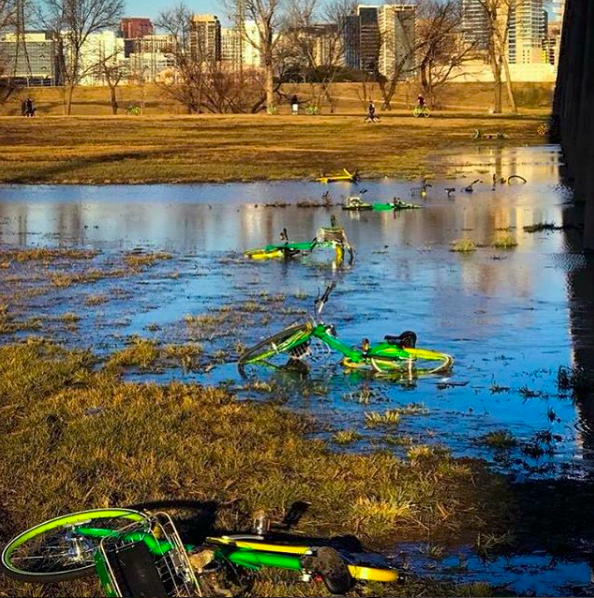The biggest bike-share experiment in the U.S. right now is happening in Dallas, and the city isn't quite sure what to do next.
Dallas has taken a very hands-off approach to regulating dockless bike-share companies, with as many as 15,000 of their bikes now on the streets. No one really knows how much the bikes are used, but they get a lot of attention in the press for not looking tidy. There's even a clever Instagram account devoted to errant bikes sighted in unexpected locations.
The city is grappling with how to make the services work and avoid an overwhelming backlash. Transportation officials have proposed a system of fees on the bikes, which would introduce incentives to limit the number of them in circulation and raise $1.8 million for the city annually. That would pay for city workers to keep the bikes more orderly -- as well as fund bike infrastructure in a city that lacks it.
But the companies say the fees are too high -- one scenario would charge $1 per bike per day. Despite the fuss over bike clutter, the City Council wants the dockless bike-share services to stick around, reports Robert Wilonsky at the Dallas Morning News, and they rejected the fees:
Council members and bike-share operators were united in their opposition to the fees as presently proposed.
Anthony Fleo, LimeBike's regional general manager, called the proposed fees "unsustainable and out of step" with the national average. Said Fleo, such exorbitant fees "would likely discourage all of" the bike companies from operating in Dallas.
Servando Esparza, Ofo's head of public policy for this part of the country, said that the proposed fees "would be 25 times higher than the greatest fee we pay in any other city."
The mobility committee has never signaled any interest in pricing the bike-share companies out of the market. At most, its members wanted to recoup the cost of keeping the sidewalks clear, fishing bikes out of the Trinity River and White Rock Lake, and letting the companies use the right of way.
So it seems like dockless bike-share isn't about to get booted out of Dallas, but the city is still grasping for a strategy to turn its large number of for-hire bicycles into real momentum for cycling as a safe, convenient, widespread mode of transportation.
In other news: Greater Greater Washington reports D.C. Metro is using color-coded escalator handrails to help people find their way to the right train. And the National Institute for Transportation and Communities shares survey results indicating that e-bike owners are replacing car trips with bicycle trips.






